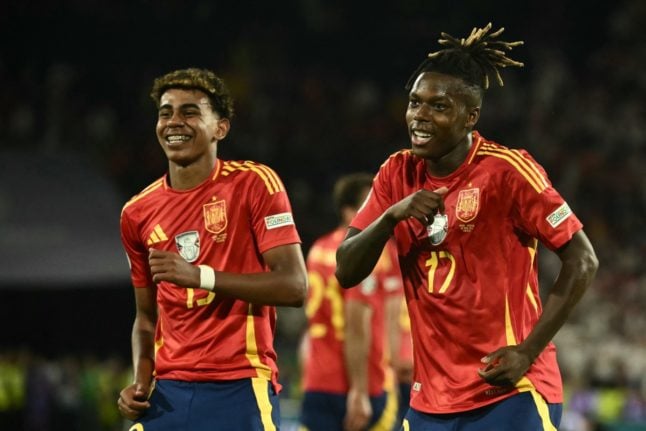It’s hard to fathom that the combined age of arguably Spain’s two most decisive players at this year’s Euros is just 37.
Barça’s Lamine Yamal (16) and Athletic Bilbao’s Nico Williams (21) have given a renewed verticality and freshness to the stale tiki-taka passing style that La Roja stuck to for some 15 years.
They’re also the first black players for La Selección to be considered the national team’s stars.
Spain hasn’t historically had a multiracial squad, although in the last five years a few black and mixed-race footballers have donned the red jersey: Thiago, Rodrigo, Ansu Fati and Adama Traoré.
Fati and Traoré, just like Yamal and Williams, are the sons of African migrants who settled in Spain.
The national team’s current lighting-fast wingers were both born in Spain – Lamine in Llobregat in Catalonia and Nico in Pamplona in Navarre – but their parents had to work hard to make ends meet before their offspring became stars.
Watching on from the stands during Spain’s 4-1 win over Georgia on Sunday was Williams’ older brother and Athletic team-mate Iñaki, a Ghana international, who looked after him as a child when their father was working in England and their mother was doing multiple jobs in Bilbao.
In Lamine’s case, his mother is from Equatorial Guinea and his father is Moroccan, bringing their son up in the working-class neighbourhood of Rocafonda in the Catalan town of Mataró.
Both players had offers from their parents’ countries to represent their national sides but they chose Spain, their country of birth, mother tongue and upbringing.
They are Spanish after all, and a representation of how Spain is becoming increasingly multicultural, equally due to global migration trends as to Spanish necessity.
Spain has one of the lowest birth rates in Europe (1.2 children on average) but immigrant families buck that trend, especially African women in Spain, who have on average 3.4 children.
Currently, one in three children born in Spain have at least one foreign parent, which explains why they’ve been described as a “demographic life jacket” by the Spanish press.
Eighty percent of them feel Spanish, according to a 2016 study by the Ortega Y Gasset Institute, compared to a measly 6 percent in the US. It’s also more common than ever for children in Spain to grow up with a mix of cultures – 16.9 percent.
Far-right Vox party may prefer that these new Spaniards be “pureblood” Josés and Marías but such wishes are not only racist, they’re delusional.
READ MORE: The real reasons why Spaniards don’t want to have children
Migrants have effectively solved the threat of Spain’s declining population, even though the issue of severe underpopulation in “Empty Spain” is still present (nonetheless, in rural areas migration is having a positive impact).
The country is set to gain another five million people by 2039, and foreigners account for almost 100 percent of this population growth.
After all, regardless of origins, new blood is needed to fill jobs and pay the pensions of Spain’s increasingly ageing population (set to be the longest living on the planet by 2040).
Additionally, data from Spain’s Social Security ministry shows that foreign workers have bolstered a solid post-pandemic recovery by the Spanish labour market.
Almost one third of all jobs created in Spain since the end of Covid-19 pandemic have been filled by foreign workers.
Yamal and Williams are a representation of the changing face of Spain – younger, more multiracial and with it, hopefully, more tolerant.
A 2022 by Spanish youth association FAD found that 75 percent of young Spaniards don’t have racist or xenophobic opinions, whilst 25 percent do.
The success of the current poster boys of Spanish football – with more than 50 million fans on TikTok combined – can hopefully help reduce those intolerance levels among the future generations even further.



 Please whitelist us to continue reading.
Please whitelist us to continue reading.
Member comments